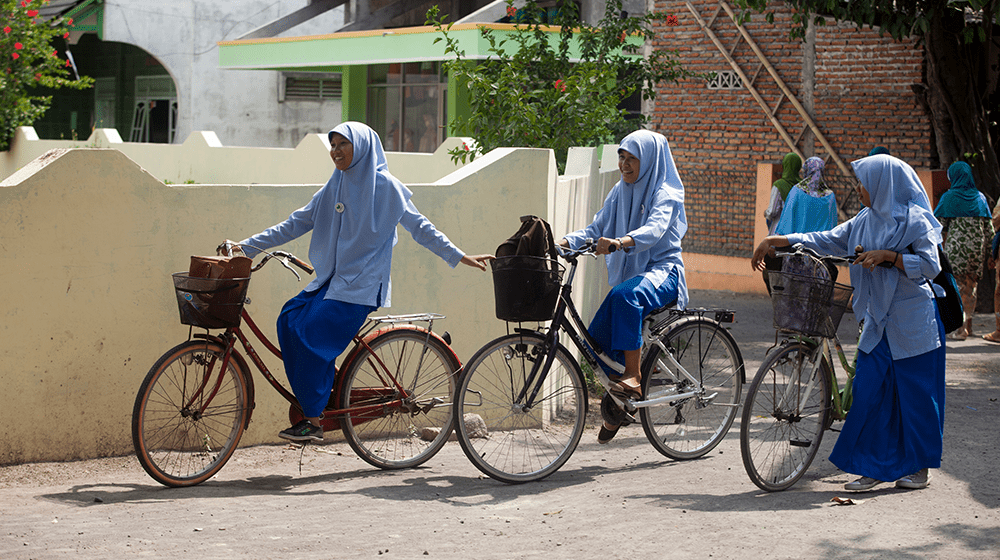Sixty-nine million people in Indonesia are school-aged children and adolescents aged 5 to 19 years old (Statistics Indonesia, 2019). While adolescence is often thought to be the healthiest time of life, they continue to face challenges such as rising levels of obesity, mental health disorders, high unemployment, and sexual violence. To help them deal with these challenges, we need an enabling environment where young people have optimal opportunities to develop their full potential and live free of poverty, discrimination, and violence – this is why RAN PIJAR is crucial.
Launched in April 2022, the National Action Plan for Improving the Wellbeing of School-Aged Children and Adolescents (RAN PIJAR) is a joint commitment among 20 ministries and government institutions to advance the well-being of young people aged 8 to 16 years. Since the beginning, the United Nations Population Fund (UNFPA) Indonesia has been a strategic partner to the Coordinating Ministry of Human Development and Culture (Kemenko PMK), the lead ministry steering the development of RAN PIJAR.
RAN PIJAR includes five strategies to improve youth well-being, which consists of 1) strengthening commitment, coordination, and cooperation across different sectors and stakeholders; 2) expanding access to quality health and nutrition services; 3) creating a safe and supportive environment for the development of school-aged children and adolescents; 4) improving the quality and access to education, life skills, and participation of school-aged children and adolescents; and 5) strengthening information systems, data, research, and innovation in programme development.
RAN PIJAR is one of the first of its kind to systematically integrate intersectoral government agencies to advance adolescents' physical, mental, sexual and reproductive health, as well as their life skills, agency, and meaningful participation in society.
"Adolescents are a significant part of the Indonesian population, particularly in building a more advanced Indonesian society. However, if this population group does not have adequate capacity and skills, they might not be able to contribute optimally to building the nation. Stakeholder collaboration at the central and district levels is the key to optimizing our efforts," said Mr Agus Suprapto, Deputy for Coordination in Improving Health Quality and Population Development of Kemenko PMK, during the High-Level Meeting to Increase the Well-being of School-Aged Children and Adolescents, held in Bali, 3 November 2022.
This High-Level Meeting was held to gain support from the local government units on RAN PIJAR, encouraging them to develop local policies and work plans to improve the well-being of school-aged children and adolescents in their respective regions. The meeting was arranged by Kemenko PMK in collaboration with UNFPA Indonesia and Yayasan Siklus Sehat Indonesia – with attendance from approximately 100 local government representatives in Bali and 500 representatives from various government agencies at the national and local levels via video conference.
"Preventable and treatable health problems like early pregnancy, unsafe sex, HIV, depression, injury, and violence remain a daily threat to Indonesian adolescents' health, well-being, and life chances,” said Anjali Sen, UNFPA Representative to Indonesia, in her remarks. “I am delighted to learn that RAN PIJAR has comprehensively covered the promotive, preventive, and curative programmes and aimed to reach out to the most marginalized and vulnerable adolescents," she continued.
Moving forward, the Provincial Government of Bali and Daerah Istimewa Yogyakarta (DIY) have agreed that the city of Denpasar and Kulonprogo will become the pilot cities to implement RAN PIJAR. The two local governments will form local action plans and work alongside non-government organisations (NGOs), academicians, and development partners to advance the well-being of school-aged children and adolescents in the two cities.
More importantly, UNFPA Indonesia will continue to work alongside youth networks in various areas of Indonesia to document young people’s needs and best practices to improve their well-being, as well as improve their capacities in advocacy and establishing youth-led reports.
“Please allow me to re-highlight the key roles of young people and adolescents in policy development. Do not forget to involve us in every strategic meeting at the local level. This policy is about our well-being, and thus should reflect our aspirations,” said Eka Purni, a youth representative from Kisara PKBI Bali.
The Action Plan serves as a reminder to strengthen joint commitments to invest in Indonesia's young people without forgetting to involve them to participate meaningfully and equally at the decision-making tables at the regional and national levels.
Giasinta Livia
Digital Health and Innovation Focal Point, UNFPA Indonesia


